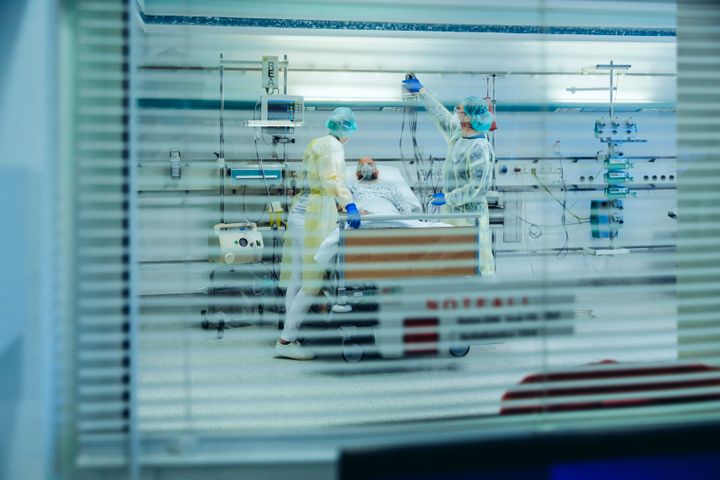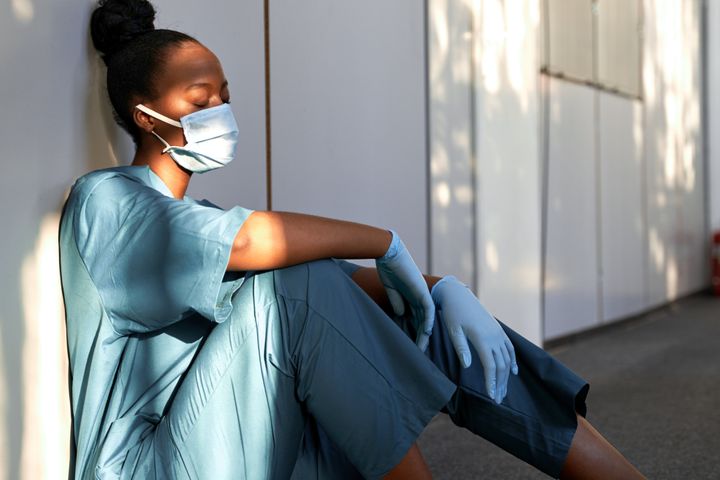News
What Frustrates Nurses The Most Right Now In The Pandemic
The coronavirus pandemic has been hard on everyone ― and those in medical fields have been feeling it twofold.
Every day, nurses across the globe put on protective equipment, go to work and care for patients battling COVID-19. Then, they head home to their families and deal with the same struggles everyone has been navigating since the initial virus surge, including feelings of uncertainty, pandemic fatigue and more.
The sacrifices health care workers are making during the pandemic, in combination with their own need to cope, makes some of the careless behavior of the public incredibly frustrating for them. Plus, policies, job changes and other challenges are exacerbating their overall struggle.
Essential medical workers like nurses deserve our help and compassion right now. We asked some nurses on the front lines about their biggest pandemic frustrations, and how you can assist in making their jobs a little bit easier.
Patients griping over shifting visitor policies
Almost every hospital or doctor’s office is changing policies to adjust to the pandemic and COVID-19 positivity rates. Tiffany Clemmy, a registered nurse in an emergency room in Jacksonville, North Carolina, said many people are constantly arguing with staff about the pandemic-era rules.
“It’s frustrating for a variety of reasons, largely because there is a 99.9% chance the person they’re arguing with did not make the policy and is just doing their job,” Clemmy explained. She reminds people that these rules are in place to protect everyone, including patients.
For instance, Clemmy’s ER currently has a limited visitor policy, which people frequently challenge. “It’s frustrating to get yelled at for a policy like that because we are every bit as frustrated … and are just trying to do the best we can,” Clemmy said.
Patients not being truthful about their COVID-19 symptoms
In Clemmy’s ER, patients with higher potential to have COVID-19 are directed to a designated acute respiratory care center where doctors and nurses are prepared to handle the virus. “But sometimes when you ask the screening questions, people are not honest because they don’t want to go to the COVID center,” Clemmy said.
This can lead to major problems. Clemmy said she’s seen issues where a patient didn’t disclose their COVID-19 symptoms, so they weren’t moved to the specific unit, which then resulted in the patient exposing and infecting others.
People ignoring COVID-19 guidelines
Robert Buechler, a certified oncology nurse in Denver, is frustrated by “the disregard of medical advice and flaunting of guidelines.”
He currently has a patient in the coronavirus unit who is on an oxygen flow dose that is highly uncommon for someone who is young and healthy. Despite this, Buechler said the patient “is doing OK, but still insists ‘it’s not COVID; it’s just pneumonia.’”
Buechler asks people to continue to socially distance, wear a mask in public and avoid large gatherings of groups outside their households.
“With the vaccines making the rounds, we’ll get through this by the end of the year but we need the public’s help on this one,” he explained.
The job is pretty unstable and tiring right now
Kiley Griffin, a resident nurse and talent advocate leader at Incredible Health, said nurses have been dealing with job insecurity, as many medical professionals have been furloughed during the pandemic.
“Many would be willing to cross-train or help other units but hospitals have laid them off instead of using them elsewhere in the hospital,” she explained.
She added that many nurses are also feeling under-appreciated and overworked. “They show up for the patients and co-workers but feel they often don’t have adequate PPE, staff or support to deal with changes on units and increased workloads,” she said.
“It saddens me that there is a large portion of the population that does not take the pandemic seriously.”
– Erin, a nurse in Phoenix
A lack of reliable testing in certain situations
Erin, a registered nurse in Phoenix who asked to withhold her last name so she could speak candidly about her job, said hospitals test patients for COVID-19 when they’re admitted but noted that there has been a lack of acknowledgment of false negatives.
“Non-COVID-19 patients are separated from COVID-19 patients. However, oftentimes they are never rechecked, unless the patient is required to go to a long-term care facility and test positive prior to discharge,” she said.
Erin said this means staff members are caring for patients who are presumed negative and are not supplied with the properly fitted masks, gowns and eye protection for droplets that can become aerosolized after medical procedures. “By the time the staff is notified (if they are) of the exposure, it has often been a week or two after caring for the patient,” she said.
Patients can’t be with their families
Erin said one of the most heartbreaking aspects of this pandemic has been seeing her patients suffer alone ― “whether they are suffering from a new terminal diagnosis, undergoing lifesaving surgery, have surgical complications, or even die without their loved ones by their side.”
Erin added that she does not think this reality is apparent to many people who have not experienced it. “And it saddens me that there is a large portion of the population that does not take the pandemic seriously,” she said.
People disregarding the advice of health care workers
“When I think about my experience as a nurse during this pandemic, our country’s lack of unity causes me great angst,” said Lauren Alptunaer, an emergency department registered nurse and Sameday Testing nurse in Washington, D.C.
“The duality of watching patients die alone while families wait outside because of COVID precautions and then witnessing on social media that ‘friends’ are having large weddings and gatherings saddens and hurts me deeply,” Alptunaer said. She said these “friends” disregard the advice given by her, experts and other health care professionals who are begging people to help end the pandemic.

The red tape to get through to administer vaccines in some areas
Robin Queen, a registered nurse in a post-anesthesia care unit in Austin, Texas, said her biggest frustration lies in the roadblocks she and her colleagues have encountered in trying to volunteer to give vaccines.
“Many of us have been thwarted by ridiculous requirements and hoop-jumping despite all of us being experienced nurses that have been vetted and background-checked ad nauseam,” she said. “Some sites require nurses to have ‘recent COVID distribution center experience’ even though most nurses have given influenza and shingles vaccinations throughout their career — too many to count!”
People’s entitled attitude combined with their refusal to wear a mask
“There are people who say they have a right to choose not to wear a mask. However, these same people will likely also believe it is their right to have a hospital bed available to them when they enter a hospital sick with COVID-19,” said Pamela Glenn, a certified nurse midwife and faculty member for Walden University’s College of Nursing.
She said in many cases, there are no beds remaining, due in large part to the number of people who choose not to wear a mask and end up getting sick. “This is both an ironic and frustrating reality right now,” she said.
People wearing masks incorrectly
Speaking of masks, seeing people not use them properly is also incredibly maddening, said Jenna Liphart Rhoads, a registered nurse and a nurse educator at Nursetogether.com.
“There have been copious amounts of public education about the proper way to wear masks and general mask hygiene, and mask-wearing has been standard for 10 months,” she said.
She’s frustrated by people wearing masks under their noses, loosely on their faces, or using dirty or old masks that have lost their efficacy. “Wearing a mask correctly truly is not a difficult skill to master and using masks the correct way does help,” she stressed.
“Amidst the chaos, nurses have not even had a moment to take in all the loss or to grieve, much less deal with the trauma of it all.”
– Pamela Glenn, certified nurse midwife
People blaming preexisting conditions for COVID-19 deaths
Crystal Slaughter, faculty member for Walden University’s RN-BSN program, said she is infuriated by people brushing off COVID-related deaths because someone had preexisting conditions. She stressed that millions of Americans live every day with preexisting conditions and are not dying.
“Not a single death due to COVID-19 is ‘OK’ and the idea that a death can be brushed aside because the individual had preexisting conditions is horrible,” she said.
The burnout that comes with doing the job during a pandemic
Nurses are getting sick with COVID-19 themselves. They are working longer hours ― “12- to 16-hour shifts are not uncommon multiple days in a row, and [nurses] are getting called in on their occasional days off due to low staffing,” Glenn said.
These nurses often have families to care for, children participating in virtual school and fears about transmitting COVID-19 to those they love. And they are often the only ones able to be with patients who are dying, caring for them during their final moments.
“Amidst the chaos, nurses have not even had a moment to take in all the loss or to grieve, much less deal with the trauma of it all,” Glenn said.
Sandra Crawley, a registered nurse in Illinois and medical consultant for MomLovesBest, said front-line workers were initially regarded as heroes. “We had thank you letters sent to us, surprises delivered, and we felt heard and seen,” she said.
Now, after 10-plus months, she said, the public is tired of the restrictions and have apathy toward the precautions. These relaxed views, Crawley said, are keeping some health care employees at work for more than 16 hours a day without proper breaks. “We are wearing out,” she said.
She wants people to understand that nurses are tired, frustrated and missing their own families. “Please remember that our patient load, mental load, and emotional load has more than doubled, and we could use a little extra TLC,” she said.
Read more

